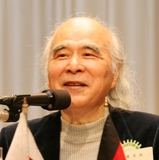��Joy and Sorrow of Mozart Songs of Playful Spirit��
March 25, 2009
Mr. Hideo Takahashi,
General Director of Mozart Theatre
 I was educated during wartime. With the end of the war we were finally liberated, but then I got ill and was forced to spend time under medical treatment for six and a half years.
I was educated during wartime. With the end of the war we were finally liberated, but then I got ill and was forced to spend time under medical treatment for six and a half years.
I listened to many musical compositions by Mozart on my sickbed, one of which was ��Divertimento in D major��K136. This piece was composed by the 16-year-old Mozart, who returned home from Italy, experienced the Renaissance and put his young enthusiasm into this music piece.
Mozart, as a musician, had severe religious obligations. He had to compose one religious musical piece on a weekly basis. He was underpaid and had to greet the guests together with servants and cooks for a long period of time.
Mozart set out on a trip to Paris at the age of 22. He was confident that he was second to none in musical composition and was convinced that he could play all kinds of music, but actually found himself without any professional appointment.
Mannheim had many of the best players and composers in Europe at the time. Mozart was no exception, leading an active and exciting musical life. He fell in passionate love with the soprano singer Aloysia Weber. He composed the ��Flute Quartet in D major��K285 during the happiest time of his life. In its first movement <Allegro in D major>, Mozart expressed his joy in a heavenward flight. The second movement <Adagio in B minor>, however, reminds me of a contradictory expression ��to love is to die little by little��.
While in Paris Mozart was with his beloved dying mother, who had always accompanied him on his travels. There is a record confirming that she was buried at the Catacombs at St. Eustache Church. ��Violin Sonata in E minor��K304 is the saddest piece in his life, composed during this period. It is a sonata for violin and piano, a two-movement, short but superb piece. In the second movement, the two instruments tune together as the melody gradually gets more cheerful and bright. This is the aesthetic principle of Mozart. ��It is you who let your mother die,�� wrote Mozart��s father in his letter to his son. Mozart endured his sorrow in silence, as he understood too well how much his mother had sacrificed while she accompanied her beloved son on his journey. Mozart had to serve the Archbishop of Salzburg after returning home. He must have shed tears as he looked at the flowing waters of the Salzach River. I feel his unspoken anguish in ��Sinfonia Concertante for Violin, Viola and Orchestra in E flat major��K364.
Failure in his job-hunting, parting with his mother and disappointed love rendered a heartbreaking blow to Mozart but he performed��Idomeneo��on his return to Munich. This was rated the highest among the opera seria. Although Mozart preferred to compose the opera buffa (comic opera), composers had to write the seria to be recognized by the aristocrats at that time.
Mozart got confident with the success of��Idomeneo��and decided to part from the Archbishop and started an independent life in Vienna. The young composer, who had no title nor job but gained freedom, released one piano concerto after another, which we still treasure today.
The supreme benefits from Mozart��s move from Salzburg to Vienna were the operas he wrote. Mozart performed the��Abduction from the Seraglio��and ��The Marriage of Figaro��in Vienna, both of which were a great success. ��The Marriage of Figaro��was received with wild enthusiasm in Prague. The grand finale��Countess, forgive me�� was an historical epoch-making setting in which the Count asked for forgiveness from the common people.
Mozart��s last year and a half was the era of oppression against the Freemasons by Emperor Leopold II. Mozart composed ��The Magic Flute��K620 along with the ��Requiem��during this period. In my personal opinion, ��The Magic Flute��is full of Mozart��s playful spirit and is his bequest to mankind.
I have always wanted to listen to European songs by words without relying on subtitles. This is why I performed��The Magic Flute��with the Japanese libretto. I made an opera version of��Alice��s Adventures in Wonderland��in Japanese the year before last. Although it is a laborious process, I want to continue my activities of singing operas in the Japanese language.